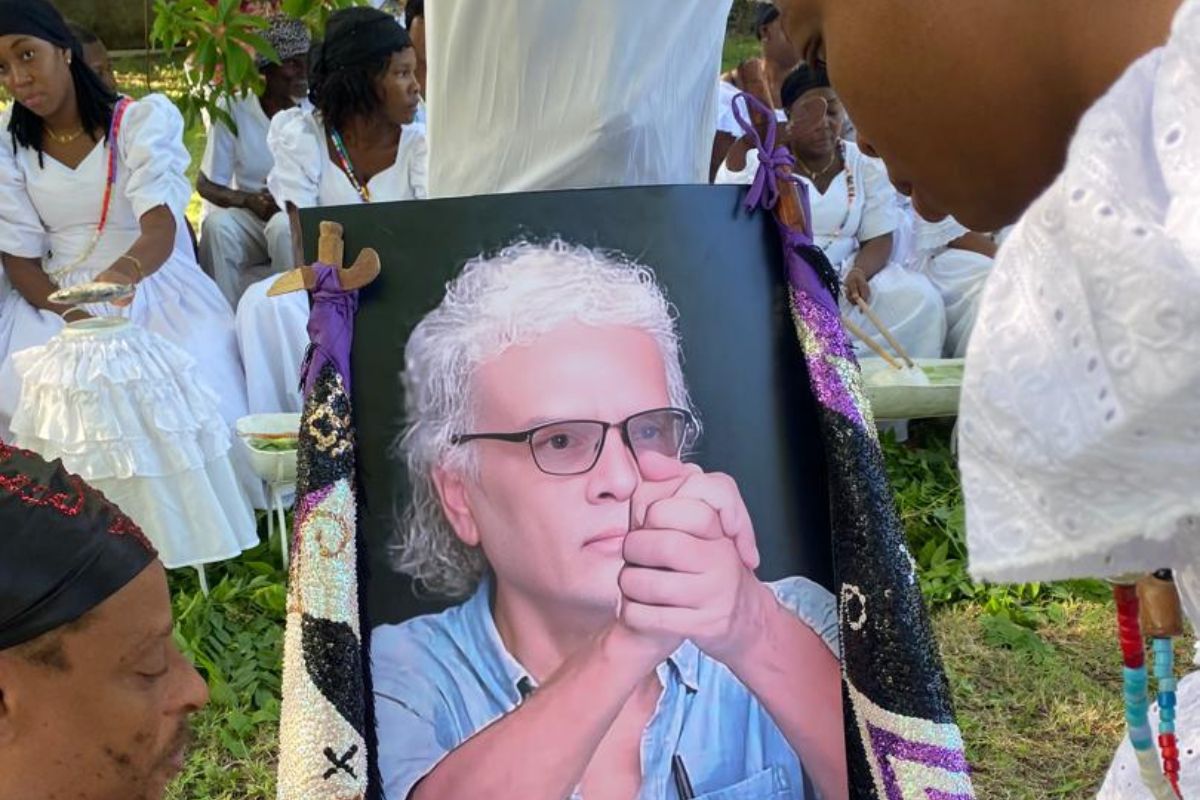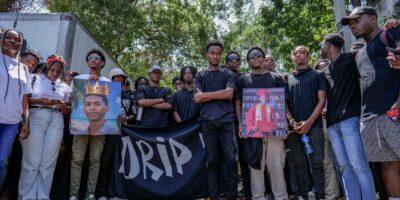After forty years of activism and a career as a professor and researcher, Didier Dominique passed away on May 18, 2025, in Port-au-Prince. The 73-year-old man suffered from pancreatic cancer
During his life, he distinguished himself in several fields: he was a trade unionist, an architect and a university professor.
Dominique Didier leaves behind a rich and remarkable intellectual and activist legacy.

On the occasion of the funeral of Didier Dominique at the Pax Villa Funeral Home and Crematorium on Route de Maïs Gâté, May 25, 2025. Photo: Louise Carmel Bijoux.
Derinx Petit Jean, historian and professor at the State University of Haiti (UEH), knew Didier Dominique as a « popular educator, » a « Marxist communist activist, » and an « organic intellectual » in defense of the « proletarian class. »
To receive a summary of the news every day on WhatsApp, click here.
Dominique was a committed figure, putting his knowledge at the service of social struggles.
« There are two things that characterize Didier Dominique: commitment and conviction, » Petit Jean emphasizes to AyiboPost.
He says he campaigned alongside him in the fight against the presence of the United Nations Stabilization Mission in Haiti (MINUSTAH) in 2017 and for compensation for cholera victims from 2010.
There are two things that characterize Didier Dominique: commitment and conviction.
–Derinx Petit Jean
This epidemic, introduced by Nepalese peacekeepers, caused nearly 10,000 deaths in Haiti. The United Nations acknowledged its responsibility for the introduction of the disease in 2016, after years of denial without providing individual compensation to victims.
Professor Petit Jean, who considers Dominique his mentor, says he benefited from his training through grassroots organizations.
“I remember that it was Didier who gave me a Creole version of the Manifesto of the Communist Party » he told AyiboPost.
Published in 1848 by Karl Marx and Friedrich Engels, this work calls on workers to unite against capitalist exploitation.
To lead this life of struggle for workers and peasants, Didier abandoned the interests of his so-called class of origin.
Born into a mulatto family of the Haitian lower middle class, Dominique was born on January 26, 1952, in Port-au-Prince, in the Bois de chêne corridor, located between Avenue Christophe and Rue Capois.
He is the youngest of six children.
Thanks to the social background and the means of his parents, Maude and Henry Dominique, he was able to benefit from opportunities that his friends in the neighborhood did not always have.
After his classical studies in Port-au-Prince, notably at the Petit Séminaire Collège Saint Martial and another local establishment, he traveled to Puerto Rico to study architecture at the University of Rio Piedras, where he met his first wife, Maryse Penette, mother of his only daughter, Arielle Dominique.
« Since his childhood, Didier Dominique began to develop a social conscience, observing the poverty that hit his friends with whom he played in the neighborhood where he lived, » one of his oldest friends and comrade, Rodolphe (Sonson) Mathurin, told AyiboPost.
During his studies in Puerto Rico, Mathurin continues, « the independence movement in vogue in Puerto Rico in the 1970s, aimed at putting an end to US domination
Since his childhood, Didier Dominique began to develop a social conscience, observing the poverty that hit his friends with whom he played in the neighborhood where he lived hard.
Upon his return to Haiti, Didier Dominique noted with acuity the deterioration of the condition of his childhood friends, who had not benefited from the same opportunities for advancement as him.
Later, he confided to his only daughter, Arielle Dominique, that this observation was a real turning point for him, encouraging him to commit to helping the most disadvantaged and to fight for social justice.
Contacted by AyiboPost, Arielle Dominique believes that Didier was deeply inspired by his older brother, Father Max Dominique, who died in September 2005 and was a priest involved in promoting liberation theology in Haiti.
This Christian movement, born in Latin America in the 1960s and 1970s, links the Christian faith to the fight against social injustice.
Max Dominique was exiled under the Duvalier dictatorship.
According to Arielle Dominique, a large part of Didier’s close family lives outside the country.
“I was informed of his illness on April 23, 2025. Less than a month later, he died in hospital,” Arielle Dominique told AyiboPost, with a hint of sadness in her voice.
Didier’s death came as a shock to his family.
His unusual career path sometimes « destroyed and worried » the family. Despite this, « he was a source of strength for us, » admits his only daughter.
Didier Dominique felt he was approaching his grave. « I feel like I’m going to leave because I don’t feel well at all, » he announced to Sonson Mathurin in March 2025, at the Anba Zanmann cultural center, located on Came Liau Street, in Bois-Verna.
Mathurin remembers Didier Dominique as his « Tokay. » A man he had the good fortune to meet 38 years ago, in a clandestine political cell, at the time when the National Governing Council led by General Henri Namphy came to power in Haiti, following the fall of the Duvaliers.
I feel like I’m going to leave because I don’t feel well at all.
-Didier Dominique
For Télémaque Pierre, a member of the Batay Ouvriye trade union platform, Dominique was a pillar of the organization and the one who had transformed the thirty-year-old structure into a mass political movement to defend workers’ rights.
Until his death, Didier was a leader and spokesperson for the union organization.
An activist and worker, Télémaque Pierre remembers being invited several times by Dominique to give presentations to students on the workers’ struggle in the university space.
Didier Dominique constantly called on workers to organize themselves, in all sectors, in order to defend their rights and interests.

On the occasion of the funeral of Didier Dominique at the Pax Villa Funeral Home and Crematorium on Route de Maïs Gâté, May 25, 2025. Photo: Louise Carmel Bijoux.
His commitment led to the creation of unions at the Electricité d’Haïti (EDH) and within the Ministry of Public Works in the north of the country.
In 2015, in collaboration with a human rights organization in the Dominican Republic, Dominique initiated a movement to enable Haitians born in the Dominican Republic and working in the fields for decades to obtain identity documents, Pierre told AyiboPost.
This initiative came in a tense context, two years after the Dominican Constitutional Court’s ruling 168-13, which rendered thousands of Haitian descendants stateless by retroactively stripping them of Dominican nationality.
For his part, Josué Merilien, coordinator of the National Union of Haitian Normaliens (UNNOH), considers Dominique as an internationalist activist whose « struggles go beyond our borders. »
He reports that in 2003, Didier Dominique opposed the establishment of industrial zones on agricultural land in the Maribaroux plain, in Ouanaminthe, in the northeast of the country.
The unionist told AyiboPost that on several occasions abroad, he shared the stage with Didier Dominique during panels addressing the situation of workers on a global scale or the symbolism of the Battle of Vertières.
Architect Didier Dominique left his mark on the National Heritage Preservation Institute (ISPAN).
Josué Merilien, coordinator of the National Union of Haitian Normaliens (UNNOH), considers Dominique an internationalist activist whose « struggles go beyond our borders. »
In the 1970s, under the direction of the famous Haitian architect and sculptor Albert Mangonès, Didier Dominique worked on the project of Inventory of Monuments and Tourist Sites of Haiti.
This was the first work of the National Office of Tourism and Public Relations (ONTP) which would form the basis for the creation of ISPAN in March 1979, testifies architect Ginette Chérubin in her farewell text to Didier Dominique shared with AyiboPost.
Dominique opted to expand the inventory in the Caribbean. Upon his return to ISPAN in the 1990s, he became one of the founding members of the Caribbean Monuments and Sites Organization (CARIMOS).
He also worked on the Citadelle Laferrière innovation project between the 1970s and 1990s.
Didier Dominique maintained a deep affinity with Vodou culture. During his pilgrimages across the country, he met anthropologist Rachel Beauvoir in Lakou Souvenance, in Gonaives, says his daughter, Arielle Dominique.
United by marriage, Dominique and Beauvoir devote their commitment to the promotion and defense of vodou.
Together, they co-authored the book Savalou E, published in 1989, which explores Haitian vodou and the world of secret societies.
This work won an award the same year at the Casa de Las Américas competition.
This prize, created in 1960, aims to promote literary and artistic works from Latin American countries, the Caribbean, and sometimes other regions of the world.
Three months after the death of Rachel Beauvoir in January 2018, Didier Dominique officially became hougan, succeeding his wife in their peristyle located in Mariani, in the commune of Carrefour, reports his daughter Arielle Dominique.
The family had wanted to hold the funeral of the deceased there, but the constant presence of gangs in the area had made access to the peristyle impossible.
Didier Dominique, a professor of urban sociology at the Faculty of Sciences of the State University of Haiti, fought for the university’s autonomy after the end of the Duvalier dictatorship in 1986, said historian and geographer Georges Eddy Lucien, contacted by AyiboPost.
Three months after the death of Rachel Beauvoir in January 2018, Didier Dominique officially became hougan, succeeding his wife in their peristyle located in Mariani, in the commune of Carrefour, reports his daughter Arielle Dominique.
« Didier remained committed to Marxist ideology until his death. He was a model of commitment and dedication to conviction, » Lucien comments.
According to the professor, Dominique is an activist who prioritized collective time over individual time.
During an activity at a friend’s house in December 2022, Lucien recounts, Didier said while greeting me: « Eddy, we have to make a revolution. »
The deceased’s daughter, Arielle Dominique, remembers that her father was passionate about ping pong and football.
The only child says she was overwhelmed by the love of her father, whom she describes as a jovial person towards her and who had a sense of humor.
« I continue to thank my father because he gave me Haiti and taught me to love my country, to know my culture, to respect others and to love the Haitian people, » says Arielle Dominique, who does not hide her pride.
By : Rolph Louis-Jeune
Cover | Portrait of trade unionist, architect, and university professor Didier Dominique.
► AyiboPost is dedicated to providing accurate information. If you notice any mistake or error, please inform us at the following address : hey@ayibopost.com
Keep in touch with AyiboPost via:
► Our channel Telegram : Click here
►Notre Channel WhatsApp : Click here
►Our Community WhatsApp : Click here







Comments